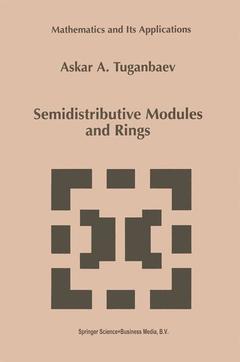Semidistributive Modules and Rings, Softcover reprint of the original 1st ed. 1998 Mathematics and Its Applications Series, Vol. 449
Langue : Anglais
Auteur : Tuganbaev A.A.

A module M is called distributive if the lattice Lat(M) of all its submodules is distributive, i.e., Fn(G + H) = FnG + FnH for all submodules F,G, and H of the module M. A module M is called uniserial if all its submodules are comparable with respect to inclusion, i.e., the lattice Lat(M) is a chain. Any direct sum of distributive (resp. uniserial) modules is called a semidistributive (resp. serial) module. The class of distributive (resp. semidistributive) modules properly cont.ains the class ofall uniserial (resp. serial) modules. In particular, all simple (resp. semisimple) modules are distributive (resp. semidistributive). All strongly regular rings (for example, all factor rings of direct products of division rings and all commutative regular rings) are distributive; all valuation rings in division rings and all commutative Dedekind rings (e.g., rings of integral algebraic numbers or commutative principal ideal rings) are distributive. A module is called a Bezout module or a locally cyclic module ifevery finitely generated submodule is cyclic. If all maximal right ideals of a ring A are ideals (e.g., if A is commutative), then all Bezout A-modules are distributive.
Introduction. Symbols. 1. Radicals, Local and Semisimple Modules. 2. Projective and Injective Modules. 3. Bezout and Regular Modules. 4. Continuous and Finite-Dimensional Modules. 5. Rings of Quotients. 6. Flat Modules and Semiperfect Rings. 7. Semihereditary and Invariant Rings. 8. Endomorphism Rings. 9. Distributive Rings with Maximum Conditions. 10. Self-Injective and Skew-Injective Rings. 11. Semidistributive and Serial Rings. 12. Monoid Rings and Related Topics. Bibliography. Index.
Askar Tuganbaev received his Ph.D. at the Moscow State University in 1978 and has been a professor at Moscow Power Engineering Institute (Technological University) since 1978. He is the author of three other monographs on ring theory and has written numerous articles on ring theory.
Date de parution : 10-2012
Ouvrage de 357 p.
16x24 cm
Thème de Semidistributive Modules and Rings :
Mots-clés :
DEX; Division; Finite; Invariant; Lattice; Morphism; Multiplication; Volume; algebra; endomorphism ring; maximum; polynomial; ring; ring theory
© 2024 LAVOISIER S.A.S.



